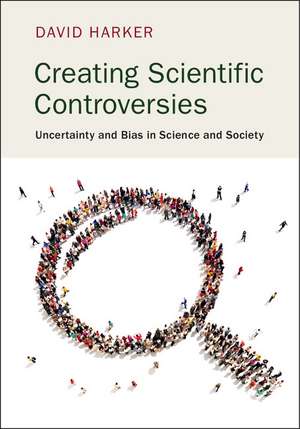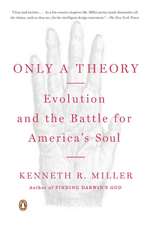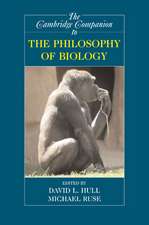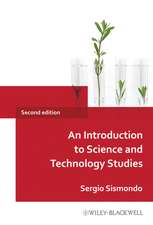Creating Scientific Controversies: Uncertainty and Bias in Science and Society
Autor David Harkeren Limba Engleză Hardback – 30 sep 2015
| Toate formatele și edițiile | Preț | Express |
|---|---|---|
| Paperback (1) | 162.90 lei 3-5 săpt. | |
| Cambridge University Press – 30 sep 2015 | 162.90 lei 3-5 săpt. | |
| Hardback (1) | 644.11 lei 17-23 zile | +63.48 lei 4-10 zile |
| Cambridge University Press – 30 sep 2015 | 644.11 lei 17-23 zile | +63.48 lei 4-10 zile |
Preț: 644.11 lei
Preț vechi: 836.51 lei
-23% Nou
Puncte Express: 966
Preț estimativ în valută:
123.25€ • 129.01$ • 102.58£
123.25€ • 129.01$ • 102.58£
Carte disponibilă
Livrare economică 07-13 martie
Livrare express 22-28 februarie pentru 73.47 lei
Preluare comenzi: 021 569.72.76
Specificații
ISBN-13: 9781107069619
ISBN-10: 1107069610
Pagini: 266
Ilustrații: 13 b/w illus. 6 tables
Dimensiuni: 180 x 253 x 16 mm
Greutate: 0.67 kg
Editura: Cambridge University Press
Colecția Cambridge University Press
Locul publicării:New York, United States
ISBN-10: 1107069610
Pagini: 266
Ilustrații: 13 b/w illus. 6 tables
Dimensiuni: 180 x 253 x 16 mm
Greutate: 0.67 kg
Editura: Cambridge University Press
Colecția Cambridge University Press
Locul publicării:New York, United States
Cuprins
Introduction: scientific authority and the created controversy; Part I. Lessons from the Philosophy of Science: 1. Defining science and the empiricist approach; 2. Two challenges for the naïve empiricist; 3. A revolution in how we think about sciences; 4. Sciences as historically and socially situated; Points to remember: Part I; Part II. Biases, Arguments and Created Controversies: 5. Inherent irrationality: cognitive biases and heuristics; 6. Thinking more clearly: arguments, reasoning and informal fallacies; 7. Created controversies and how to detect them; Points to remember: Part II; Part III. Exposing Created Controversies: 8. Environmental scare: the case of anthropogenic climate change; 9. Sciences, religion and an intelligently design controversy?; 10. Issues of public health: aids, autism and GMOs; Points to remember: Part III; Concluding remarks; References; Index.
Recenzii
'Harker has produced a valuable book that introduces students to important insights from the philosophy of science and cognitive psychology in order to prepare them for grappling with major debates at the intersection of science and society.' Kevin Elliott, Michigan State University
'This is a stimulating and engaging book that introduces some of the core issues in the philosophy of science by taking the reader through a variety of important scientific controversies. By means of this novel approach it offers a useful resource to not only philosophers of science and their students but also anyone concerned about rational decision making and critical thinking in general, including the scientifically literate public and scientists themselves.' Steven French, University of Leeds
'This is a unique and important book that addresses a topic of pressing social and political importance with great care and clarity, and an excellent understanding of the relevant science. This is applied philosophy of science at its best.' James Ladyman, University of Bristol
'This book has the look and feel of a classroom text, complete with topics for discussion at the end of each chapter. … Harker spends a good deal of time providing background on the history of the philosophy of science, elementary logic, and the literature on cognitive bias. Each of these topics in and of themselves is useful. Indeed, Harker's explanation of the problem of underdetermination of theory by evidence was extremely well done. The explanation of the literature on cognitive bias was also a nice compendium of diverse research findings.' Lee McIntyre, Metascience
'This is a stimulating and engaging book that introduces some of the core issues in the philosophy of science by taking the reader through a variety of important scientific controversies. By means of this novel approach it offers a useful resource to not only philosophers of science and their students but also anyone concerned about rational decision making and critical thinking in general, including the scientifically literate public and scientists themselves.' Steven French, University of Leeds
'This is a unique and important book that addresses a topic of pressing social and political importance with great care and clarity, and an excellent understanding of the relevant science. This is applied philosophy of science at its best.' James Ladyman, University of Bristol
'This book has the look and feel of a classroom text, complete with topics for discussion at the end of each chapter. … Harker spends a good deal of time providing background on the history of the philosophy of science, elementary logic, and the literature on cognitive bias. Each of these topics in and of themselves is useful. Indeed, Harker's explanation of the problem of underdetermination of theory by evidence was extremely well done. The explanation of the literature on cognitive bias was also a nice compendium of diverse research findings.' Lee McIntyre, Metascience
Notă biografică
Descriere
This is the first book-length introductory analysis of the concept of a created scientific controversy.

















